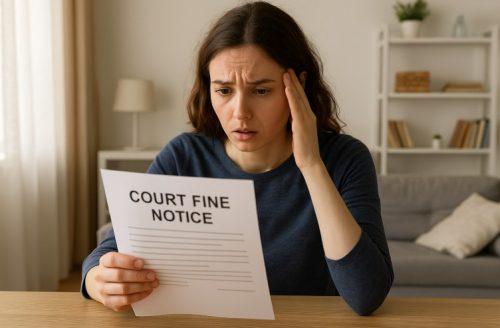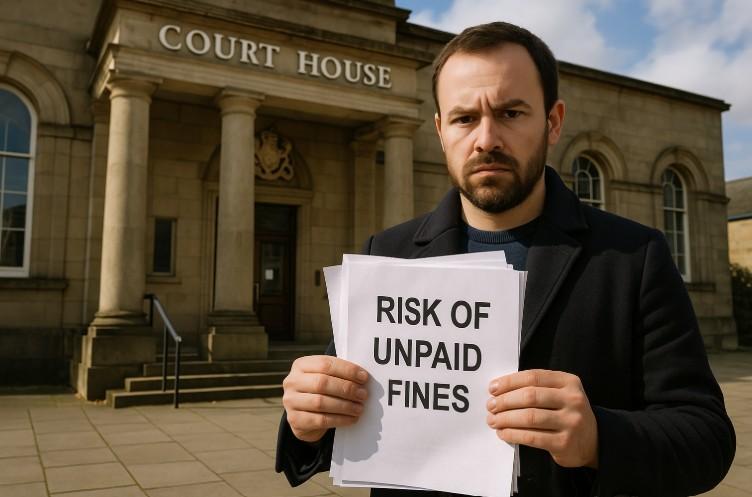Have you ever wondered what could happen if you don’t pay a court fine in the UK? While it might seem like a simple financial matter, unpaid fines can quickly spiral into more serious consequences, including prison.
In 2025, the enforcement of unpaid fines has become stricter, and understanding the legal process is more important than ever. This guide will help you understand how much jail time you could face, how courts decide on enforcement, and what you can do to avoid ending up behind bars.
Can You Really Be Sent to Jail for Unpaid Fines in the UK?

Yes, but jail is always a last resort. The UK legal system gives you multiple chances to pay a fine or make arrangements before taking that step.
When you’re issued a fine by the court, you are legally obligated to pay it. If you ignore it or fail to pay without a good reason, the court may believe you’re deliberately avoiding payment. In such cases, the magistrates can issue a committal warrant, a court order that could land you in prison.
But don’t worry, the system is designed to be fair. The court must investigate your financial situation before deciding to imprison you. They will consider your income, employment status, assets, and any legitimate reasons for the delay in payment.
What Is a Default Period and How Does It Work?
A default period is a specific amount of jail time assigned if a court fine remains unpaid. This term is set when the fine is issued, but only comes into effect if you fail to pay and the court determines that no other enforcement method has worked.
This system is regulated by Section 139 of the Powers of Criminal Courts (Sentencing) Act 2000, which requires a court to fix a prison term in default of payment. The intention is not to punish people who are unable to pay, but to deter those who refuse to pay despite having the means. Let’s take a look at how jail terms correlate with unpaid amounts.
Prison Time Based on Unpaid Fines
| Unpaid Fine Amount (£) | Maximum Default Jail Term |
| Not exceeding £200 | 7 days |
| £200 – £500 | 14 days |
| £500 – £1,000 | 28 days |
| £1,000 – £2,500 | 45 days |
| £2,500 – £5,000 | 3 months |
| £5,000 – £10,000 | 6 months |
| £10,000 – £20,000 | 12 months |
| £20,000 – £50,000 | 18 months |
| £50,000 – £100,000 | 2 years |
| £100,000 – £250,000 | 3 years |
| £250,000 – £1 million | 5 years |
| Over £1 million | 10 years |
This table isn’t applied in a strictly mathematical way. For example, a £55,000 fine is likely to attract a sentence closer to 18 months than the full 2 years.
How Much Jail Time Could You Get Based on Your Unpaid Fine?

The more you owe, the greater the risk of a longer prison sentence. Courts look at both the fine amount and your willingness to pay. Let’s say you were fined £3,000 and failed to make any effort to pay. If the court finds you had the means but intentionally avoided payment, you could be sentenced to up to 3 months in jail.
However, if you were genuinely struggling due to job loss or illness, and you kept the court informed, it’s far more likely the court will offer alternative enforcement options first.
Courts aim to distinguish between:
- Wilful refusal to pay (which may lead to prison)
- Inability to pay (which typically leads to instalment plans or deferred payment)
Will the Court Always Send You to Prison First?
Absolutely not. The UK courts follow a progressive enforcement approach, exhausting all other options before issuing a prison sentence.
Before sending you to jail, the court may:
- Deduct the fine from your wages or Universal Credit
- Seize or clamp your vehicle
- Send enforcement agents (bailiffs) to collect payment
- Ask you to attend a means hearing to explain your situation
- Offer you a suspended committal (a final warning)
A suspended committal is often your last chance. It gives you time to pay the outstanding amount or face actual imprisonment.
What Happens If You Simply Can’t Afford to Pay?

If you’re genuinely unable to pay your court fine, the worst thing you can do is ignore it. Courts are more sympathetic when you’re honest and proactive.
Here’s what you should do:
- Contact the court immediately
- Request a means hearing
- Show evidence of financial hardship (bank statements, benefit claims, etc.)
The court will review your case and may:
- Reduce your payment amount
- Allow you to pay in instalments
- Postpone payment until your financial situation improves
But if you ignore letters, court summons, or enforcement notices, the court may assume you’re dodging the fine and escalate enforcement, possibly leading to jail.
Do You Always Have to Pay the Court Fine in Full Immediately?
Not necessarily. Most fines don’t require immediate full payment unless:
- You appear to have enough income or assets to pay in full
- You’re considered a flight risk
- You are sentenced to custody for another offence at the same time
In most other cases, courts allow weekly or monthly instalments based on your income and outgoings. You may be asked to complete a Statement of Means form to support your request for time to pay.
Is Serving Jail Time a Way to Avoid Paying the Fine?
Technically, you can end up in jail for not paying your fine. But choosing jail over payment is not a loophole or an easy way out. In some cases, such as with confiscation orders, imprisonment does not cancel the debt.
You will still owe the amount even after serving the default term. According to R v Smith [2009] EWCA Crim 344, default sentences exist to encourage payment, not to provide an escape. So while jail time might temporarily stop enforcement action, it doesn’t necessarily make the fine disappear.
What Legal Support Is Available If You’re at Risk of Imprisonment?

If your liberty is at stake, you may qualify for legal aid. It’s vital to get help as early as possible.
A solicitor can:
- Represent you at a means hearing
- Negotiate more affordable payment plans
- Advise on your rights and responsibilities
- Challenge unfair enforcement
Legal aid is available if your case involves a risk of imprisonment, especially when default sentences are involved.
Conclusion
Unpaid court fines can lead to jail time in the UK, but only when all other enforcement options have failed. In 2025, courts remain committed to fairness, but they also expect accountability.
If you’re struggling financially, don’t ignore the problem. You have options, from payment plans to legal assistance. The sooner you take action, the less likely you are to face serious consequences like imprisonment.
FAQs
What are the most common fines that lead to jail time in the UK?
The most common are criminal court fines from magistrates, particularly for offences like theft, assault, or public order violations.
Can I go to jail for not paying a parking fine or council fine?
Not directly. These are usually enforced through civil procedures, not criminal ones. Jail time doesn’t apply in most cases.
What happens if I ignore a magistrate court fine letter?
It triggers a chain of enforcement actions, from deductions to court summons. If ignored long enough, it can result in imprisonment.
Can bailiffs take my belongings for unpaid fines?
Yes. Bailiffs, or enforcement agents, can seize property, clamp your vehicle, or even enter your home with a warrant.
Will imprisonment for unpaid fines clear my debt?
Not in all cases. Some fines, especially under confiscation orders, remain payable after release.
Is there a statute of limitations on unpaid fines in the UK?
No. Court fines don’t expire and can be enforced indefinitely unless paid or cancelled through legal procedures.
How can I challenge or appeal a fine I can’t afford to pay?
You can request a means hearing or apply to vary the payment terms. It’s important to act quickly and provide clear financial evidence.








